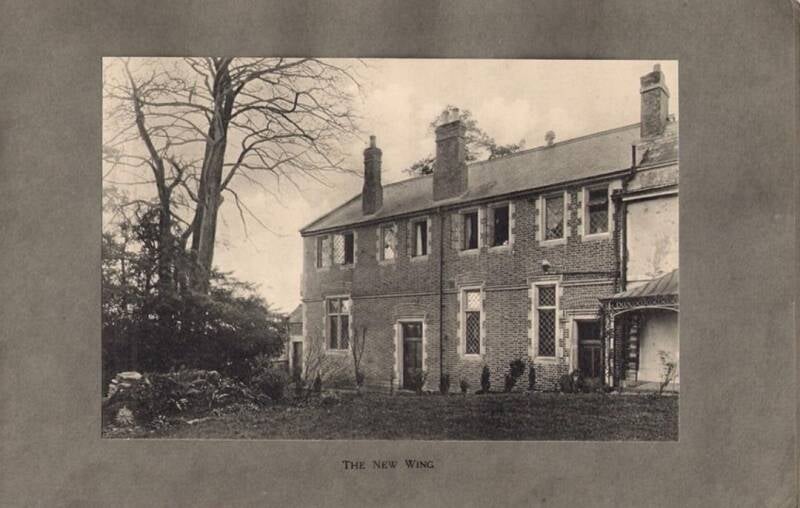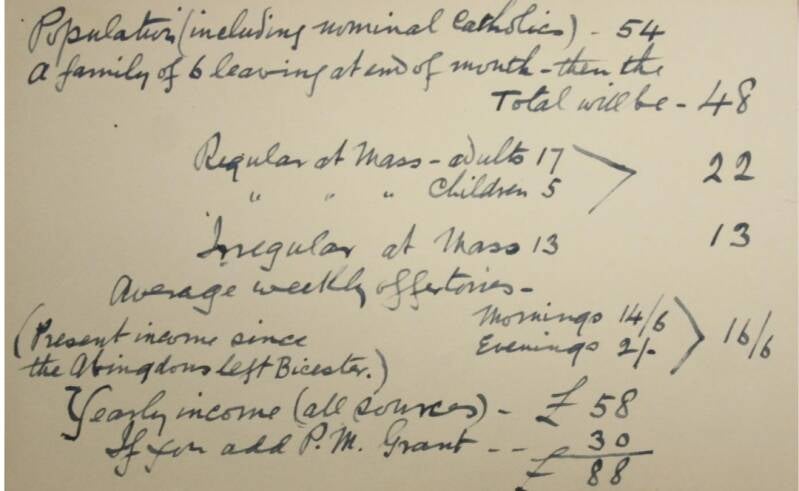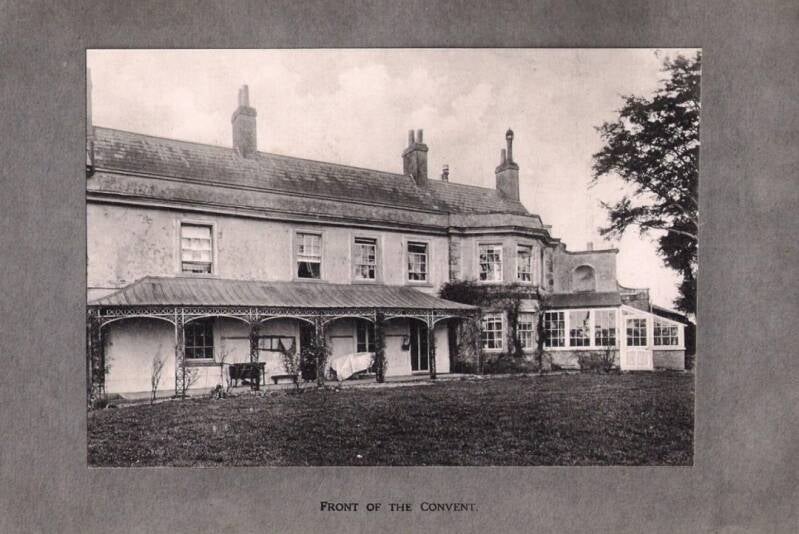Catholicism in 1920's Bicester, and a Priest's Breakdown
By Mark [Guest Contributor to The Bicestorian]
There is a short, simple, matter of fact note in the log of St Mary's School, dated the 8th of September 1924, recording that:
"I am sorry to have to record that our Reverend manager, Fr. Heron, has left us. He has been moved to Foxcote, near Gloucester."
This, however, belies a far more dramatic course of events that brought about this outcome. The Archives of the Diocese of Birmingham contain a series of letters written by Heron to the Diocesan authorities, and it is interesting to follow the developing chain of events through this correspondence with Monsignor Glancey, and the light that it sheds upon the Catholic community of 1920's Bicester.
Rev. Fr. Christopher Patrick Heron took over care of Bicester's small Catholic community in 1921. He had been born in Carlow, Ireland, on 9th March 1866. By the time of the 1921 census, he was living in two rooms in Corbett Street in Droitwich, Worcestershire, possibly ministering to the spiritual needs of the faithful at the Church of the Sacred Heart and St Catherine of Alexandria. Sometime after census day (19th June 1921), he moved to Bicester, and the 1922 and 1924 electoral registers have him living at The Priory, taking over from Rev. Fr. John Hanrahan.
The Priory (below) still stands, a large brick building at the meeting of Chapel Street, Priory Lane and Priory Road, now converted into residential apartments. Since the early years of the century, it had been home to a community of exiled French Olivetan Benedictine nuns from Igoville, in Normandy. They returned to France in the 1920's, and their former chapel became Bicester's Catholic Church, until the present one was built in the 1960's. A directory from the Diocese of Birmingham for 1921 gives Bicester's Catholic population as being only 83.

The first letter that we have suggesting that all was not well is dated 24th April 1924.
"As it is impossible to carry out the Holy Week services here I ask for permission to have a Low Mass on Holy Thursday. I believe that the people of Stonor have appealed to you for a resident priest. I would be grateful if you sent me there. This place cannot support a resident priest. I explained the situation in my last letter. With all kind wishes for Easter."
[the previous letter mentioned, if it still exists, has not been traced].
Prior to the liturgical changes of the Second Vatican Council of the 1960's, a Low Mass was one which was recited without singing by the celebrant, without a deacon, sub-deacon or choir assisting the celebrant, and without the use of incense.
Stonor Park, in the Chilterns on the borders of Oxfordshire and Buckinghamshire - not far from Henley-on-Thames - was a centre for Recusant activity following the English Reformation. The Stonor family, resident for more than eight centuries, remained staunchly Roman Catholic throughout the considerable perils and costs that their stance brought with it.
The following month, on the 21st May, Rev. Fr. Christopher Heron wrote again:
"I write to ask if there is any hope of my being transferred to some small mission where there is sufficient support. In my letter of July 13th 1923 I explained the wretched circumstances in which I have to live here. And I believe that the Dean also wrote you on the subject. Of course I know I have no claim whatsoever on your consideration. But I am most anxious to remain in this Diocese as I have been in it since October 1917. But if there is no hope in improving my position I think it would be wise to look elsewhere. So, Monsignor, in case you cannot offer me another place, may I depend on your kind recommendation etc. if there is a chance elsewhere? Apologies for troubling you. P.S. In case of need I am making enquiries about a little place in Wilts."
The following day, he wrote again - apparently there had been developments concerning Wiltshire:
"In my letter last night I said I was making enquiries about a place in Wiltshire. I now have full information from Lord Nelson. It is a Chaplaincy near Salisbury - like the Chaplaincy near Roxton. Mass every morning in the domestic Chapel and on Sundays & Holy Days in the Public Chapel etc. I think it would suit me quite well. Do you think I should accept it? Or should I wait for a better place in the Diocese? I am enclosing a stamped form for a reply in case you say 'yes', so that I could write to-night to Lord Nelson. Of course the Bishop of Clifton would have to approve. So, if you advise me to accept, will you be kind enough to recommend me to the Bishop and help me to get the post. I shall be most grateful if you do. I am sorry to trouble you, knowing your hands are so full at present."
Heron wrote again on the 9th July - it seems there is another letter missing in the sequence. He refers to it in his latest plea:
"As I said in my last letter, another applicant got the Chaplaincy... So, I appeal to your kindness to
give me a change from Bicester. Any place will do so long as the work is light and within my strength. The chief object of my appeal is to get out of Bicester. I don’t think the faith will make any progress here. There is too much impurity and moral filth. And the Catholics are too indifferent to Religion and have no love for God. And most of them are a scandal to their Church. Moreover the Catholic population is decreasing. There are no industries to bring people here. And the Catholics won’t have any more children. They have learned the tricks of Birth-control. There are only 7 Catholic children in the school. And 3 of them are leaving soon, as their father has been promised a house elsewhere nearer his work. Bicester cannot support a resident priest. Only one of the guarantors gives any help. And Lord & Lady Abingdon who have been staying near Bicester for some time, are now leaving. So, the small income will be smaller still. Moreover, as I told you in a former letter, the conditions which I have to live in this school room are wretched, and are affecting my health - mentally and physically. I therefore appeal to you to do what you can for me. Apologising for troubling you, and thanking you for past kindness."
The letter thankfully omits any tabloid press details as to what "most of them" were doing that was a scandal to their church, apart from not having sufficient children. The "tricks of birth control" could refer to the opening, in 1921, in London, of the first ever birth control clinic by Maria Stopes. The contraceptive pill was not introduced until the 1960's. Also, latex was invented in the 1920's, and it gradually replaced the old rubber condoms - although the name 'rubber' still persists in the United States. Overall, Europe and America were not open to the concept of birth control in the 1920's - many saw it as promoting lewd behaviour.
This letter was followed by another dated 4th August, whose tone is more desperate than its predecessor:
"Please pardon me for troubling you again. But I feel I am going to have a breakdown in health if I don't get out of Bicester soon. I, therefore, appeal to your kindness and common sense to give me a change. Any poor little country place will do. If you wish me to make any suggestions re further provision for Bicester I shall do so."
Three days later, Rev. Fr. Heron penned his longest letter of this exchange of correspondence:
"I am very grateful for your kind letter. My willingness to accept a poor country place is the result of a conversation with my brother who was in London a few weeks ago. I told him what a wretched place this was, and he saw for himself how my health was failing. So, he urged me to get to some little country place, even a poor place, and he would help when necessary. His last words at the station were, "get out of that hole soon or you will soon be in your grave". With regard to provision for Bicester. I have discussed this subject with a few Catholics - the only ones who take interest in it. From these discussions I have drawn the following conclusions: Bicester cannot support a resident priest. The movement to petition the Archbishop was organised by the priest, not by the people. Some people desire to have it supplied for Sunday Mass - say from Oxford or Begbroke. The others would prefer to go to Hethe - for the sake of the drive in the country. I am told they could get a charabanc there and back for 1/- each provided a certain number subscribed. It is a short run - about 5 or 6 miles. This, I think, would be the more popular arrangement, and the more easy for you. My own wish is to have Mass here - at least once a month - if possible. I am hoping and praying that you will soon be able to relieve me. But I understand better now your difficulties."
At this point in its history, Catholic Bicester was administered from the older foundation of the Holy Trinity in Hethe, and it did not become a parish in its own right until 1943. Begbroke Manor House, about a mile or so west of Kidlington, was built in about 1700. In the 19th century it became part of the Priory of St Philip, which until 2000 was the novitiate house for the Roman Catholic Servite Friars in England. The Servite Friars became well known around the village during the Second World War, acting as ARP (Air Raid Precautions) Wardens.
A week later, on 11th August, Heron wrote again:
"I herewith send the information you ask for. I agree with you about the charabanc plan. It would be alright in fine weather. But in the winter very few would go. In answer to your questions - if there is no resident priest, of course the church would have to be kept locked, and the key left in someone's charge. It would make no different to the congregation except one woman. She is the only person who comes to the church during the week. If the priest leaves she will go away and live with her daughter. In fact she is thinking of going before the winter in any case. The school could be managed as in former years, by the priest of Hethe. He has a car, and comes in often. There is a good trustworthy teacher in charge. After the holidays there will only be 4 Catholic children in the school. I shall be glad to give any further information you might require."
On the reverse of one of the pages of the letter, Rev. Fr. Christopher Heron gives a demographic and financial breakdown of Bicester’s Catholic population at the time - reproduced below. He says that there
were, including nominal Catholics, fifty-four Catholics in Bicester of which six would be leaving at the end of
the month. Of these just seventeen adults and five children are described as being regular Mass goers. A further thirteen are described as irregular attendees at Mass. The average weekly collection was fourteen shillings and six pence in the morning, and just two shillings in the evening. The annual income was £8815.
The change of location and getting away from "that hole" may indeed have helped Rev. Fr. Christopher Heron to escape an early grave. By 1939 he had stepped down from active ministry and was living in retirement in Bournemouth. It was there that he passed away on the 10th of December 1944, having reached the goodly age of 78 years, with his effects, totalling £34316 going to Charles Harman Heron, a victualler, and possibly the brother who had advised and urged him to leave Bicester some twenty years before.



Create Your Own Website With Webador